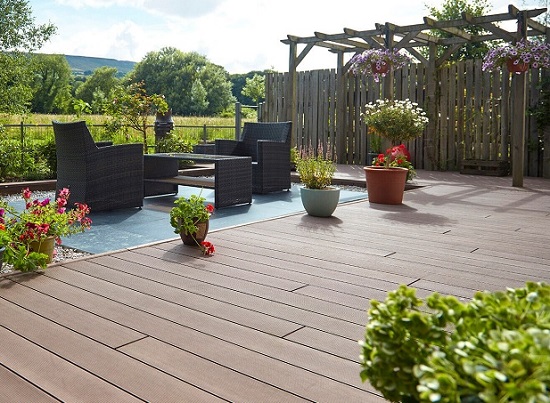The Benefits of Composite Decking
Reading time: 5 minutes
What is composite decking?
Wood Plastic Composite (WPC) decking has made a big impact in the landscaping arena. It can be used in home gardens, as well commercial settings, and is a great alternative to wooden decking boards boasting a much longer life.
What is composite decking made of?
This type of deck board is often made up of approximately 95% recycled plastic and wood flour - it is this mix that makes it strong, hard wearing and rot resistant - not to mention sustainable. There are even some brands that boast a mix of 100% recycled materials.
What are the benefits of composite decking?
Composite deck boards are considered stronger than timber planks because of their innovative construction, which gives them a longer life span. Timber will suffer damage from the elements over time, unlike the composite material that won’t warp, splinter or rot - making it comfortable under bare feet too.
Here we list the top benefits of composite decking:
- Low Maintenance: Requires minimal upkeep compared to traditional wood decking. No need for sanding, staining, or sealing.
- Durability: Resistant to fading, staining, scratching, and mould. It can withstand harsh weather conditions.
- Sustainable: Often made from recycled materials, making it a sustainable choice.
- Aesthetic appeal: Available in a variety of colours and finishes, mimicking the look of natural wood without the drawbacks.
- Longevity: Designed to last longer than traditional wood decking, providing long-term value.
- Weather resistance: Doesn’t warp or rot, even in wet conditions.
Being virtually maintenance free, you won’t need to continually re-stain or varnish, and will benefit from an occasional wipe down with warm soapy water, to keep it looking like new. You can read more about composite decking aftercare here. And, with the added benefit of UV stabilisers this type of decking is less likely to fade and deteriorate.
What are the downsides of composite decking?
Although composite decking offers many benefits there are some potential downsides, especially when compared to timber decking:
- Higher initial cost: Composite decking tends to be more expensive upfront than traditional timber decking. But this could be offset by its longevity.
- Heat retention: Composite materials can get quite hot in intense direct sunlight, which could make them uncomfortable to walk on barefoot.
- Appearance: While composite decking can mimic the look of wood, it doesn’t have the same natural beauty and unique grain patterns that real timber offers.
- Potential for sagging: Over time, composite decking can be prone to sagging and bending, especially if not properly supported.
We hope that this article has helped answer some of your questions about the benefits of composite decking. Now you can make an informed choice and get the best out of your outside space with decking.
If you are looking for more Gardens & Landscaping ideas and inspiration head over to our dedicated hub for more tips and advice.
Disclaimer: The information contained on this page is intended as an overall introduction and is not intended as specific advice from a qualified professional. Travis Perkins aims to avoid, but accepts no liability, in the case that any information stated is out of date.
Always refer to the manufacturer's guidance for installation instructions and product maintenance.











